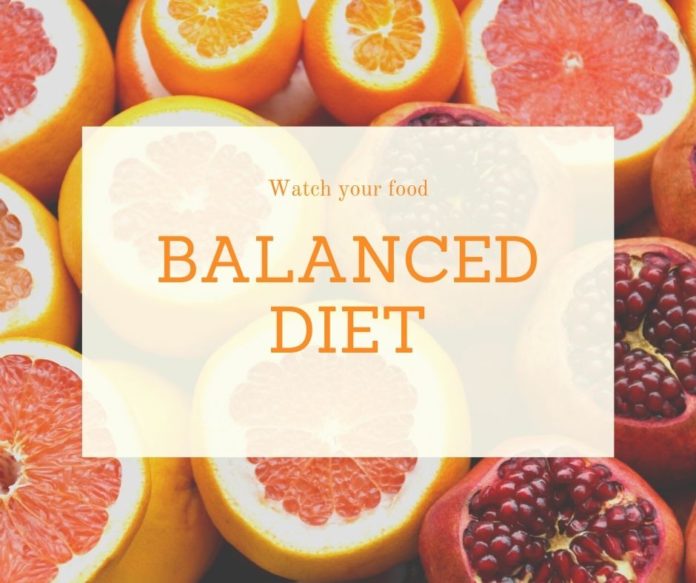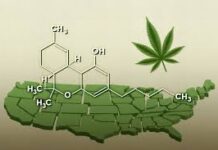Carbohydrates, fat, protein, fiber, minerals, vitamins and water are the seven components of a balanced diet. A balanced diet is a diet that contains vegetables, fruits, grains, dairy and protein sources such as meat, fish, soybean in certain proportions and quantities to supply the requirement of carbohydrates, proteins, fat, minerals, and vitamins. Rice, corn and other grains are good sources of carbohydrates. Meat, fish, soybean, wing beans, chick pea, dairy products such as milk, cheese are good sources of proteins. Butter, cheese, groundnut and sesame are good sources of fat. Vegetables, fruits are good sources of minerals, vitamins, and water. Vegetarians can consume Plant-based diets or plant-based protein sources such as wing bean, chick pea, soybean. The body can produce non-essential amino acids by itself. But essential amino acids such as lysine, methionine, valine, tryptophan, leucine, histidine should be obtained by food. Therefore, a balanced diet is essential for a healthy life.
History
The word diet is derived from diatia (A Greek word). Romans and Greeks understood that health and weight are influenced by food and exercise. The first best selling diet book was written by Bartolomeo Sacchi in 1474. Alvise Cornaro adopted a frugal diet. Diet & health: with key to the calories was published by Lulu Hunt Peters in 1918. The Atkins diet of the 1970s, the Dukan diet of the 2000s are gluten-free diets.
The benefits of balanced diet
- Providing nutrients that can maintain a healthy and strong body.
- Preventing Non-communicable diseases such as diabetes, high blood pressure
- Protecting from communicable diseases
- Strengthening the immune system and increasing immunity
- Maintaining healthy body weight
- Supplying energy
- Having a better sleep
- Improving brain function
- Preventing malnutrition
- Preventing obesity
Non-communicable diseases occurred mainly due to bad habits and food patterns. Non-communicable diseases are cancers, heart disease. Smoking, over consumption of alcohol, lack of exercise, consuming instant food, more salt, more trans-fat and unhealthy diets are the reasons for non-communicable diseases. A balanced diet is a kind of a healthy diet. More salt, unsaturated fatty acids are causes of high blood pressure. Vitamin is an essential and important nutrient due to it can increase immunity. When some harmful viruses and germs enter the body, those viruses are destroyed and a resistance is created due to having a strong immunity. Fruits are rich in vitamins and minerals. Fibrous food such as leafy vegetables, lasia stalks can reduce diseases like constipation. People are suffering from COVID 19 pandemic these days. People who have a weak immune system are severely affected by COVID 19 virus. When people consume instant food and fatty food, proper nutrition is not obtained by them. Only carbohydrates and fat are got by consuming instant food. It causes obesity. When required energy is not obtained, people become lethargic. Omega 3 can improve brain functions. Salmon, tuna, herring, anchovies, nuts, seeds, soybean oil, canola oil are good sources of omega 3.
The sources of nutrients:
- Carbohydrates: whole grains, tubers, legumes such as lentils, peas, kidney beans, vegetables
- Lipids: Avocados, fatty fish, groundnut, almonds, eggs
- Protein: Fish, Seafood, meat, eggs, dairy products, legumes
- Vitamin: (Vitamin A- Spinach, carrot), (Vitamin E- vegetable oils, seeds and nuts), (Vitamin B- fish, meat), (Vitamin C- Citrus fruits)
- Mineral: (iron-fish, red meat, beans, egg yolks, legumes), (Sodium and Chloride- Soy sauce, table salt), (Potassium- milk, vegetables, fruits, grains, legumes, meat), (Calcium- milk, dairy products, sprats, canned fish), (Magnesium- seeds and nuts, vegetables, legumes, seafood), (Sulfur- meat, eggs, fish, legumes, nuts, milk)
- Fiber: Oats, brown rice, barley, lasia stalk, leafy vegetables
- Essential amino acids: Eggs, Cottage cheese, fish, mushrooms, beans, legumes, tofu
Functions of different nutrients
Carbohydrates: Providing energy, building macromolecules, storing energy as glycogen mainly in muscles and liver, sparing protein and fat for other uses, breaking down fatty acids and avoiding ketosis
Lipids: Storing energy, maintaining temperature, Formation of cholesterol, formation of membrane lipid layer (lipids act as structural components of cell membranes), dissolving fat-soluble vitamins
Protein: Repairing and building body tissues, coordinating body functions, maintaining a proper pH and fluid balance, providing a structural framework, acting as a messenger due to some hormones are proteins (Insulin, Glucagon), Fighting against harmful viruses and bacteria as antibodies or immunoglobulins
Vitamins: needed for growth, development and normal cell function, increasing immunity and increasing the resistance to diseases
Minerals: Maintaining a proper fluid balance (Potassium, Chloride, Sodium), important at the formation of enzymes and hormones, muscle contraction (Mg), nerve transmission (Sodium, Potassium), blood pressure regulation (Ca), blood clotting (Ca), building strong teeth and bones, maintaining a normal heartbeat, regulate growth and development (Iodine), being a part of many enzymes (Cu, Zn)
The bad effects of poor nutrition
- Obesity and overweight
- High cholesterol and high blood pressure
- Type-2 diabetes, stroke, heart disease, osteoporosis, tooth decay, cancers, complication
- Fatigue
- Long term health problems
Reasons that some people don’t get a balanced diet or a healthy diet
- Severity of poverty
- Lack of awareness
- High cost of healthy foods
- Lack of time
- Bad habits of people
- Less availability of healthy foods
Simple guidelines for a balanced diet
- Consuming lots of vegetables and fruits
- Minimizing high intake of processed food and fast/ instant foods
- Reducing food that has more saturated fat, sugar
- Consuming more fish
- Consuming less salt (6 g/ day)
- Drinking more water
- Consuming fibrous food
- Doing behavioral changes (about food consumption, minimizing alcohol use)
- Consuming a variety of food.
Due to the busy schedule, nowadays people consume lots of fast food and instant food. And also they didn’t get much time to do exercises. Therefore, they have to face lots of health problems. The diet should be low in fat, sugar. Consuming more and more vegetables and fruits avoid diseases, due to those things having vitamins and minerals. Some people didn’t get a proper, nutritious meal due to the severity of poverty. Even though some people have an enough income source, they don’t consume a balanced diet daily due to lack of awareness.
A balanced diet supports us to do our day to day work efficiently and effectively by providing required energy and nutrients, increasing immunity, and avoiding diseases. Awareness programs should be implemented to increase the people’s knowledge about balanced diet and to introduce readily/easily available nutritious foods.
Author’s bio
I am Iresha Mihirani who is interested in writing and drawing. I create short stories, articles, scientific fictions, essays, cartoons, and doodles in my leisure time. I write to give happiness to readers and to express a valuable idea or a message to society.
















